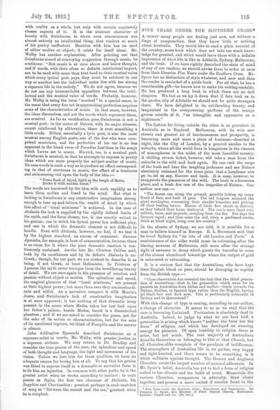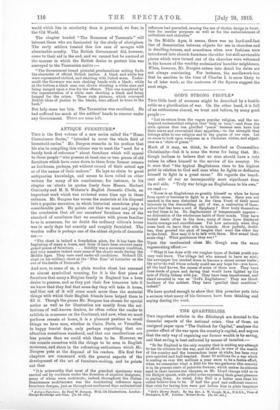FIVE YEARS UNDER THE SOUTHERN CROSS.*
A GREAT many people are feeling just now, not without a tinge of compunction, that they know little or nothing about Australia. They would like to read a plain account of
the country, some book which does not take too much know- ledge for granted, and which would leave them with a definite
impression of what life is like in Adelaide, Sydney, Melbourne, and the bush. If we have rightly described the state of mind of any of our readers, we should advise them to order at once from their libraries Five Years under the Southern Cross. Mr. Spurr has no distinction of style whatever, and now and then the reader is reminded of a guide-book. For all that, he has a
considerable gift—be knows bow to make his writing readable. He has produced a long book in which there are no dull chapters. We feel as we lay it down that if fate took us to the garden city of Adelaide we should not be quite strangers there. We have delighted in its exhilarating beauty, and languished in the overpowering perfume of the orange groves outside of it, ," as intangible and oppressive as a nightmare."
The fashion for living outside the cities is as prevalent in Australia as in England. Melbourne, with its wide new streets and general air of handsomeness and prosperity, is becoming more and more a place of business—deserted at night, like the City of London, by a general exodus to the suburbs, where all the world lives in bungalows in the clearest of atmospheres in the midst of the most beautiful scenery. A shilling return ticket, however, will take a man from the suburbs to the wild and back again. He can visit the verge
of the bush and bear the laughing jackasses and see Nature absolutely untamed for the same price that a Londoner can go to, let us say, Harrow and back. It is easy, however, to exaggerate the pleasures of the wild. The bush is a fearsome place, and a bush fire one of the tragedies of Nature. Our author saw one :- "The flames ran along the ground, greedily licking up every frond of fern, and bush of gum. The red tongues mounted the giant eucalyptus, consuming their slender branches and picking off their healing leaves. Masses of birds flew about in distress, as they beheld their home destroyed. The roads were lined with rabbits, foxes, and serpents, escaping from the fire. For days the furnace raged; and than came the end, when a perfumed smoke, thick as black night, hung over the country."
In the streets of Sydney, we are told, it is possible for a man to believe himself in Europe. R. L. Stevenson said that he loved Sydney for " its bits of old London and Paris." A reminiscence of the older world must be refreshing after the blazing newness of Melbourne, still more after the strange sight of newness in decay which greets the traveller in some of the almost abandoned townships where the output of gold is exhausted or exhausting.
It is a curious fact that the Australians, who have kept their English blood so pure, should be diverging No rapidly from the British type :— " Close observation has revealed the fact that the third genera tion of Australians—that is, the generation which owns for its parents an Australian-born father and mother—tends towards the. Italian, Sicilian, or Spanish type rather than the English, having jet black hair and dark eyes. This is particularly noticeable in Sydney and in Queensland."
With this change of type is coming, according to our author, a change of character. It seems to us as we read that the race is becoming Latinized. Puritanism is absolutely dead in
Australia. Indeed, to judge by what we are here told, a generation is arising which knows " neither the form nor the force" of religion, and which has developed an amazing
energy for pleasure. Of open hostility to religion there is some, but not much. The vast majority of Australians
describe themselves as belonging to this or that Church, but all Churches alike complain of the paralysis of indifference. The atmosphere of Australian life is, we gather, very happy and light-hearted, and there seems to be something in it which militates against thought. The Roman and Anglican Churches count the largest number of nominal adherents. In Mr. Spurr's belief, Australia has yet to find a form of religion' suited to her climate and her habit of mind. Meanwhile the various Churches, companions in adversity, draw closer together, and present a more united if smaller front to the • Five Years under the Southern Cross Experiences and Impressions. By Frederic, C. Spurr, lute Minister of First liaptist Cburch. Melbourne. London; Cassell and Co. [6s. net.]
world which lies in secularity than is presented, we fear, in the Old World.
The chapter headed "The Romance of Tasmania" will interest those who are fascinated by the study of aborigines. The early settlers treated this low race of savages with abominable cruelty. The British Government did, however, come to their aid in the end, and we cannot but be amused at the manner in which the British desire to protect him was conveyed to the Tasmanian native :—
" The Government issued pictorial proclamations setting forth the character of official British justice. A black and white boy were represented clothed, and standing with linked arms. Under- neath the Governor was seen shaking hands with a black ; while at the bottom a black man was shown shooting a whito man and being hanged upon a tree for the offence. This was completed by the representation of a white man shooting a black and being hanged for the crime. Those rude pictures, which conveyed British ideas of justice to the blacks, were affixed to trees in the bush."
But help came too late. The Tasmanian was moribund. He
had suffered too much at the settlers' hands to recover under any Government. There are none left.



































 Previous page
Previous page